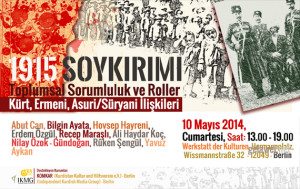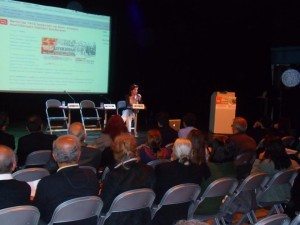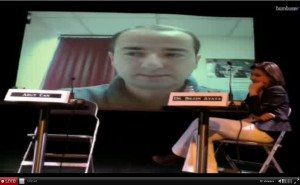Clik here to view.

The poster of the conference
BERLIN, Germany (A.W.)—On May 10, a conference on “The 1915 Genocide: Collective Responsibility and Roles; Kurdish, Armenian, Assyrian Relations” was held in Berlin. It brought together two generations of Kurdish intellectuals to discuss inter-communal relations before and after the genocide and the responsibilities of Kurds in the process and conciliation and making amends.
Armenian Weekly Editor Khatchig Mouradian delivered the following speech, in Turkish, calling on Kurdish opinion-makers and politicians to expand and deepen their role in bringing justice to the victims of the Armenian Genocide.
For the Turkish version of the speech, click here.
***
I pass through Diyarbakir on all my trips to Turkey.
In January 2013, I was scheduled to speak at a conference in Ankara dedicated to Hrant Dink, and once again I decided to first make a stop in Diyarbakir.
It was Jan. 17 when I landed in Diyarbakir. Some of you here will remember that day. Hundreds of thousands had gathered for the funeral of activist Sakine Cansiz and her comrades.
As I stood in the crowd listening to the speeches, my mind wandered from Dersim to Diyarbakir to Ankara…
Two days later, in Ankara, I delivered my first speech in Turkish.
I started like this:
How did Turkish come to me?
I did not learn it to add one more foreign language to my CV.
Turkish came to me the day I was born. I had not asked for it, yet I could not reject it, either.
It came to me in the voice of my grandmother.
For you, Turkish is the mother tongue. For me it’s my grandmother’s language.
My grandparents survived the genocide and ended up in Lebanon with practically nothing. They rebuilt their lives from scratch, and gave my parents the gift of life.
And when I was born, they gave me one of the few things they were, in fact, able to bring with them from Kilikia: the Turkish language.
For you, Turkish is the language of parental love.
For me, it is the burden of death and dispossession.
My Turkish has memories of death and dispossession from Adana, Kilis, Konya Eregli, and Hasanbeyli. The villages and towns of my grandparents.
And today, for the first time, I speak that language from a podium.
Today, for the first time, I return that gift of death and dispossession to the lands it came from…
At the end of the speech, I said:
But asking others to open their eyes and acknowledge the suffering of Armenians can never be enough.
What is necessary is justice.
So today, I return the language of death and dispossession to you.
And instead, in the name of my grandparents, Khachadour and Meline Mouradian, Ardashes and Aghavni Gharibian, I demand a language of justice.
Today, as we discuss “The 1915 Genocide: Collective Responsibility and Roles,” I once again think about the funeral and my speech. And my mind wanders from Dersim to Diyarbakir to Ankara. Because I believe the road to justice passes through Diyarbakir.
Clik here to view.

A scene from the conference (Photo: Gelawej.net)
I can hear the sound of justice, albeit faint, in the ringing of the Sourp Giragos Church bell, in the voices of Islamized Armenians learning the Armenian language, and—sometimes—in the statements of Kurdish leaders.
And that sound must be amplified, so that it reaches Van, Hakkari, Şırnak, Dersim, Batman, Bitlis, and Ağrı.
And eventually Ankara.
Let us not talk about brotherhood and peace. I am tired of the incessant use, misuse, and abuse of these words in Turkey.
Let us not talk about shared dolma, shared pain, an Anatolian diaspora, Turkish passports, lobbies, condolences, and other absurdities.
The road to conciliation passes through justice. There are no shortcuts.
Ankara keeps the border with Armenia shut, but Diyarbakir can open another border: The border with the diaspora.
And that border can only open with justice.
As we approach the centennial of the Armenian Genocide, let our minds, together, wander from Dersim, to Diyarbakir, to Ankara.
Many of you here know that Sakine Cansiz was from Dersim, and that her nom de guerre, Sara, was her Armenian grandmother’s name.
Hundreds of thousands gathered to pay their respect to Sakine Cansiz in January last year. But that respect has not been paid to Sakine’s grandmother, and the million and a half who perished during the genocide.
Clik here to view.

Mouradian during his speech.
That respect has not been paid to my grandparents.
So let hundreds of thousands gather in Diyarbakir on April 24, 2015, to commemorate the genocide of the Armenians, Assyrians, and Pontic Greeks.
And to make the voice of justice stronger.
The post The Road from Diyarbakir: A Call to Deepen Kurdish Commitment to Genocide Justice appeared first on Armenian Weekly.